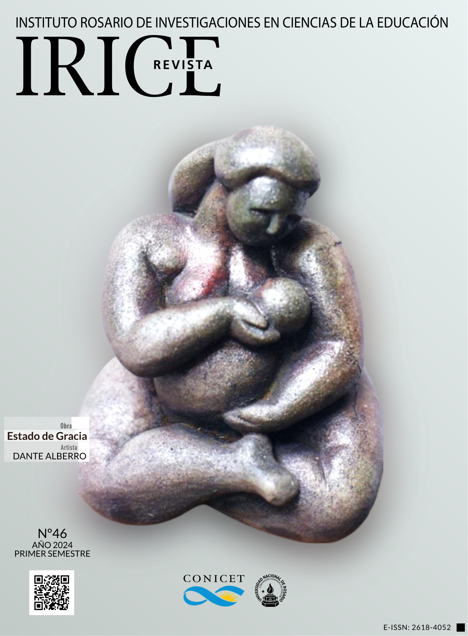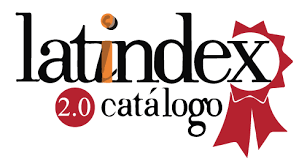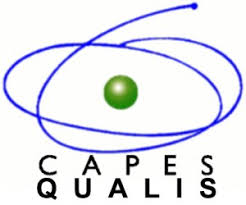Between stories and play: the development of explanatory discourse at home during early childhood
DOI:
https://doi.org/10.35305/revistairice.vi46.1850Keywords:
children’s discursive development, explanation, storybook reading, playAbstract
This paper aims to contribute to the study of the acquisition of explanation as a form of extended discourse during childhood. The explanatory talk produced in storybook reading and play situations with 30-month-old children and their caregivers was analyzed. Participants lived in middle income argentinean homes in the city of Buenos Aires, Argentina. The explanatory discourse units were analyzed according to the type of explanation, who initiated and produced them, and their level of distance from the immediate environment of the situation. The results showed that in both activity contexts, participants produced different types of explanations, primarily initiated by the mother. During play, children independently produced more explanations (vs. storybook reading). In these situations, there was also a tendency towards a predominance of high-level explanations that contributed to the use of non-immediate speech of high relevance for children's cognitive and socio-emotional development. Taken together, the study findings provide additional evidence about the relevance of early childhood experiences at home for discursive development, and contribute to account for the specificity of the two activity contexts considered to promote the development of explanatory discourse.
Downloads
References
Andresen, H. (2005). Role play and language development in the preschool years. Culture & Psychology, 11(4), 387-414. https://doi.org/b72p22
Aukrust, V. (2004). Explanatory discourse in young second language learners’ peer play. Discourse Studies, 6(3), 393-412. https://doi.org/bmfrw3
Aukrust, V., & Snow, C. (1998). Narratives and explanations during mealtime conversations. Language in Society, 27(2), 221-246.
Bamberg, M., & Moissinac, L. (2003). Discourse development. En A. C. Graesser, M. A. Gernsbacher & S. R. Goldman (Eds.), Handbook of discourse processes (pp. 395-437). Routledge.
Barbieri, M., Colavita, F., & Scheuer, N. (1990). The beginning of the explaining capacity. En G. Conti Ramsden & C. Snow (Eds.), Children's language (Vol.7, pp. 245-272). Erlbaum.
Beals, D. (1993). Explanatory talk in low-income families’ mealtime conversations. Applied Psycholinguistics, 14(4), 489-513. https://doi.org/d7tb7f
Beals, D., & Snow, C. (1994). "Thunder is when the angels are upstairs bowling": Narratives and explanations at the dinner table. Journal of Narrative and Life History, 4, 331-352. https://doi.org/gq9jm3
Blum-Kulka, S. (2002). ‘Do you believe that Lotís wife is blocking the Road 85 (to Jericho)?’: Co-constructing theories about the world with adults. En S. Blum-Kulka & C. Snow (Eds.), Talking to adults. The contribution of multiparty discourse to language acquisition (pp. 85-116). Erlbaum.
Blum-Kulka, S., Hamo, M., & Habib, T. (2010). Explanations in naturally occurring peer talk: Conversational emergence and function, thematic scope, and contribution to the development of discursive skills. First Language, 30(3-4), 440-460. https://doi.org/czcz5g
Bruner, J. (1986). El habla del niño. Paidós.
Callanan, M., & Oakes, L. (1992). Preschoolers' questions and parents' explanations: Causal thinking in everyday activity. Cognitive Development, 7(2), 213-233. https://doi.org/bzfkch
Callanan, M., Shrager, J., & Moore, J. (1995). Parent-child collaborative explanations: Methods of identification and analysis. Journal of the Learning Sciences, 4(1), 105-129. https://doi.org/bnb697
Colletta, J., & Pellenq, C. (2009). The development of multimodal explanations in French children. En M. Nippold & C. Scott (Eds.), Expository discourse in children, adolescents, and adults. Development and disorders (pp. 63-99). Erlbaum.
Consejo Nacional de Investigaciones Científicas y Técnicas (2006). Resolución 2857/06. Lineamientos para el comportamiento ético en las Ciencias Sociales y Humanidades. https://goo.su/jQw6gz
Contin, L., & Rodríguez Garrido, C. R. (2021). La lectura del libro en la escuela infantil como facilitador de la atención conjunta en bebés. En C. Rodríguez Garrido & J. L. de los Reyes (Eds.), Los objetos sí importan: Acción educativa en la escuela infantil (pp. 83-108). Horsori.
Crowley, K., Callanan, M., Tenenbaum, H., & Allen, E. (2001). Parents explain more often to boys than to girls during shared scientific thinking. Psychological Science, 12(3), 258-261. https://doi.org/csnsrh
Deckner, D., Adamson, L., & Bakeman, R. (2006). Child and maternal contributions to shared reading: Effects on language and literacy development. Journal of Applied Developmental Psychology, 27(1), 31-41. https://doi.org/dcz8tg
Dickinson, D. & Tabors, P. (Eds.). (2001). Beginning literacy with language: Young children learning at home and school. Brookes.
Egan, S. M., Hoyne, C., & Beatty, C. (2021). The home play environment: The Play and Learning in Early Years (PLEY) Study. En A. Leavy & M. Nohilly (Eds.), Perspectives on Childhood (pp. 219-242). Cambridge Scholar Publishing.
Gabouer, A., & Bortfeld, H. (2021). Revisiting how we operationalize joint attention. Infant Behavior and Development, 63, 101566. https://doi.org/mf85
Goodsitt, J., Raitan, J., & Perlmutter, M. (1988). Interaction between mothers and preschool children when reading a novel and familiar book. International Journal of Behavioral Development, 11(4), 489-505. https://doi.org/mf86
Griffin, T., Hemphill, L., Camp, L., & Wolf, D. (2004). Oral discourse in the preschool years and later literacy skills. First Language, 24(2), 123-147. https://doi.org/b95khs
Grolig, L. (2020). Shared storybook reading and oral language development: A Bioecological Perspective. Frontiers in Psychology, 11, 1818. https://doi.org/gmp464
Haden, C., Reese, E., & Fivush, R. (1996). Mothers' extratextual comments during storybook reading: Stylistic differences over time and across texts. Discourse Processes, 21(2), 135-169. https://doi.org/bffznb
Heath, S. (1983). Ways with words: Language, life, and work in communities and classrooms. Harvard University Press.
Heller, V. (2014). Discursive practices in family dinner talk and classroom discourse: A contextual comparison. Learning, Culture and Social Interaction, 3(2), 134-145. https://doi.org/mf87
Hickling, A., & Wellman, H. (2001). The emergence of children's causal explanations and theories: Evidence from everyday conversation. Developmental Psychology, 37(5), 668-683. https://doi.org/d9hgwt
Howard, A., Mayeux, L., & Naigles, L. (2008). Conversational correlates of children's acquisition of mental verbs and a theory of mind. First Language, 28(4), 375-402. https://doi.org/bcdbtf
Javerzat, M. C. (2014). La co-construction de mondes dans la lecture conjointe d’albums de fiction en petite et toute petite sections. Repères, 50, 15-34. https://doi.org/mf88
Jisa, H. (2004). Growing into academic French. En R. Berman (Ed.), Language development across childhood and adolescence (pp. 135-162). Benjamins.
Kelemen, D., Emmons, N., Seston Schillaci, R., & Ganea, P. (2014). Young children can be taught basic natural selection using a picture-storybook intervention. Psychological Science, 25(4), 893-902. https://doi.org/f5xcnm
Kitamura, S. (1996). Ardilla tiene hambre. Fondo de Cultura Económica.
Leech, K., Haber, A., Jalkh, Y., & Corriveau, K. (2020). Embedding scientific explanations into storybook impacts scientific discourse and learning. Frontiers in Psychology, 11, 1016. https://doi.org/gm7hc7
Leech, K. A., McNally, S., Daly, M., & Corriveau, K. H. (2022). Unique effects of book-reading at 9-months on vocabulary development at 36-months: Insights from a nationally representative sample of Irish families. Early Childhood Research Quarterly, 58, 242-253. https://doi.org/mf89
Legare, C., & Clegg, J. (2014). The development of children’s causal explanations. En S. Robson & S. Flannery (Eds.), The Routledge International Handbook of Young Children's Thinking and Understanding (pp. 65-73). Routledge Handbooks Online.
Legare, C., Lane, J., & Evans, E. (2013). Anthropomorphizing science: How does it affect the development of evolutionary concepts? Merrill-Palmer Quarterly, 59(2), 168-197. https://doi.org/gp63qq
Lindquist, K., MacCormack, J., & Shablack, H. (2015). The role of language in emotion: Predictions from psychological constructionism. Frontiers in Psychology, 6, Article 444. https://doi.org/f68cmt
MacWhinney, B. (2000). The CHILDES Project: Tools for Analyzing Talk (3ª ed.). Erlbaum.
McCabe, A. Bailey, A., & Melzi, G. (2008). Spanish-language narration and literacy: Culture, cognition, and emotion. Cambridge University Press.
Melo Herrera, M., & Hernández Barbosa, R. (2014). El juego y sus posibilidades en la enseñanza de las ciencias naturales. Innovación educativa, 14(66), 41-63.
Migdalek, M., Rosemberg, C., & Arrue, J. (2015). Argumentación infantil en situaciones de juego: diferencias en función del contexto. Propuesta Educativa, 22, 79-88.
Nelson, K. (1996). Language in cognitive development: Emergence of the mediated mind. Cambridge University Press.
Nelson, K. (2007). Young minds in social worlds. Experience, meaning and memory. Harvard University Press.
Nicolopoulou, A., & Ilgaz, H. (2013). What do we know about pretend play and narrative development? A response to Lillard, Lerner, Hopkins, Dore, Smith, and Palmquist on" the impact of pretend play on children's development: a review of the evidence". American Journal of Play, 6(1), 55-81.
Ninio, A., & Bruner, J. (1978). The achievement and antecedents of labeling. Journal of Child Language, 5, 1-15.
Orr, E., & Geva, R. (2015). Symbolic play and language development. Infant Behavior and Development, 38, 147-161. https://doi.org/f66dtc
Pappas, C. (1993). Is narrative “primary”? Some insights from kindergartners’ pretend reading of stories and informational books. Journal of Reading Behavior, 25, 97-127. https://doi.org/czfh2s
Peets, K., & Bialystok, E. (2015). Academic discourse: Dissociating standardized and conversational measures of language proficiency in bilingual kindergarteners. Applied Psycholinguistics, 36(2), 437-461. https://doi.org/f62qxr
Pellegrini, A., & Galda, L. (1990). Children 's play, language, and early literacy. Topics in Language Disorders, 10(3), 76-88.
Peralta, O., & Salsa, A. (2001). Interacción materno-infantil con libros con imágenes en dos niveles socioeconómicos. Infancia y Aprendizaje, 24(3), 325-339. https://doi.org/c96tx2
Phillips, G., & McNaughton, S. (1990). The practice of storybook reading to preschool children in mainstream New Zealand families. Reading Research Quarterly, 196-212. https://doi.org/bw9wj3
Pogossian, A. (2021). Exploring vocabulary knowledge and home language experiences on aspects of young children’s oral explanatory discourse skills. University of California. https://goo.su/c5wHis6
Quasthoff, U., Heller, V., & Morek, M. (2017). On the sequential organization and genre-orientation of discourse units in interaction: An analytic framework. Discourse Studies, 19(1), 84-110. https://doi.org/f9wsth
R Core Team (2017). R: A language and environment for statistical computing. https://www.r-project.org/
Ravid, D., & Tolchinsky, L. (2002).Developing linguistic literacy: A comprehensive model. Journal of Child Language, 29, 417-447. https://doi.org/dmsjp9
Rosemberg, C. (2010). Las situaciones de juego: una matriz para el desarrollo infantil. En P. Sarlé (Coord.), Lo importante es jugar (pp. 41-56). Homo Sapiens.
Rosemberg, C., Silva, M. L., & Stein, A. (2010). Narrativas infantiles en contexto: un estudio en hogares de barrios urbano marginados de Buenos Aires. Revista del Instituto de Investigaciones en Ciencias de la Educación, 28, 135-153.
Roskos, K., & Christie, J. (2001). Examining the Play-Literacy Interface: A critical review and future Directions. Journal of Early Childhood Literacy, 1, 59-89. https://doi.org/d6f5mq
Sarlé, P., & Rosemberg, C. (2015). Dale que? Juego dramático y el desarrollo del lenguaje en niños pequeños. Homo Sapiens.
Seidman, S., Nelson, K., & Gruendel, J. (1986). Make believe scripts: The transformation of ERs in fantasy. En K. Nelson (Ed.), Event knowledge: Structure and function in development (pp. 161-187). Erlbaum.
Sepúlveda, A., & Álvarez-Otero, B. (2010). El aprendizaje de los usos expositivos del lenguaje. Ciencias de la Salud, 8(2), 45-59.
Shiro, M. (2012). Y entonces le dijo…la representación del habla en las narraciones de niños venezolanos. Boletin de Lingüística, 24, 119-143.
Sigel, I. E. (2002). The psychological distancing model: A study of the socialization of cognition. Culture and Psychology, 8(2), 189-214. https://doi.org/bstdsn
Sim, Z. L., & Xu, F. (2017). Learning higher-order generalizations through free play: Evidence from 2- and 3-year-old children. Developmental Psychology, 53(4), 642-651. https://doi.org/f94gdw
Snow, C. (2014). Input to interaction to instruction: Three key shifts in the history of child language research. Journal of Child Language, 41, 117-123. https://doi.org/f6bncn
Snow, C., Porche, M., Tabors, P., & Harris, S. (2007). Is literacy enough? Pathways to academic success for adolescents. P. H. Brookes.
Snow, C., & Uccelli, P. (2009). The challenge of academic language. En D. Olson & N. Torrance (Eds.), The Cambridge handbook of literacy (pp. 112-133). Cambridge University Press.
Stein, A., Franco Accinelli, A., & González Lynn, E. (2021). ¿Y esto qué es? ¿Por qué...? El desarrollo de unidades de discurso explicativas durante la lectura de cuentos en el hogar. Revista de Psicología, 17(33), 81-103. https://doi.org/gkbchz
Stein, A., & Migdalek, M. (2017). La construcción del “mundo de ficción” y de la trama narrativa en situaciones de juego simbólico en el hogar. Actualidades en Psicología, 31(122), 2-15. https://doi.org/mf9m
Stein, A., Migdalek, M., & Rosemberg, C. (2020). Argumentación, narración y explicación: un estudio de las unidades de discurso en conversaciones espontáneas durante situaciones de comida. Cultura y Educación, 32(4), 705-737.
Stein, A., Migdalek, M., & Sarlé, P. (2012). “Te enseño a jugar”: Caracterización de movimientos interaccionales y formas lingüísticas mediante las cuales se regula la interacción lúdica. Psykhe, 21(1), 55-67. https://doi.org/mf9h
Stein, A., & Rosemberg, C. (2012). Compartir cuentos en el hogar. Diferentes estilos de lectura en poblaciones urbano marginadas de Argentina. Infancia y Aprendizaje, 35(4), 405-419. https://doi.org/mf9k
Sulzby, E., & Teale, W. (1987). Young children's storybook reading: Longitudinal study of parent-child interaction and children's independent functioning. Spencer Foundation.
Tolchinsky, L. (2004). The nature and scope of later language development. En R. Berman (Ed.), Language development across childhood and adolescence (pp. 233-248). Benjamins.
Van Kleeck, A., Gillam, R., Hamilton, L., & McGrath, C. (1997). The relationship between middle-class parents book-sharing discussion and their preschoolers' abstract language development. Journal of Speech, Language and Hearing Research, 40, 1261-1271. https://doi.org/gkspgf
Veneziano, E., & Hudelot, C. (2002). Développement des competences pragmatiques et théories de l'esprit chez l'enfant: Le cas de l'explication. En J. Bernicot, A. Trognon, M. Guidetti & M. Musiol (Eds), Pragmatique et psychologie (pp. 215-236). Presses Universitaires de Nancy.
Veneziano, E., & Sinclair, H. (1995). Functional changes in early child language: the appearance of references to the past and of explanations. Journal of Child Language, 22, 557-581. https://doi.org/dz9pnv
Weisberg, D., Zosh, J., Hirsh-Pasek, K., & Golinkoff, R. M. (2013). Talking it up: play, language development, and the role of adult support. American Journal of Play, 6(1), 39-54.
Zunino, G. (2017). Procesamiento psicolingüístico de relaciones causales y contracausales. En I. Arroyo Hernández (Ed.), La expresión de la causa en español (pp.199-234). Visor.
Published
How to Cite
Issue
Section
License
Copyright (c) 2024 Alejandra Stein, Eliana Belén González Lynn, Ailín Paula Franco Accinelli

This work is licensed under a Creative Commons Attribution-NonCommercial-ShareAlike 4.0 International License.
Aquellos autores/as que tengan publicaciones con esta revista, aceptan los términos siguientes:
- Los autores/as conservarán sus derechos de autor y garantizarán a la revista el derecho de primera publicación de su obra, el cuál estará simultáneamente sujeto a la Licencia Creative Commons Reconocimiento-NoComercial-CompartirIgual 4.0.
- Los autores/as podrán adoptar otros acuerdos de licencia no exclusiva de distribución de la versión de la obra publicada (p. ej.: depositarla en un archivo telemático institucional o publicarla en un volumen monográfico) siempre que se indique la publicación inicial en esta revista.
- Se permite y recomienda a los autores/as difundir su obra a través de Internet (p. ej.: en archivos telemáticos institucionales o en su página web) antes y durante el proceso de envío, lo cual puede producir intercambios interesantes y aumentar las citas de la obra publicada. (Véase El efecto del acceso abierto).




















